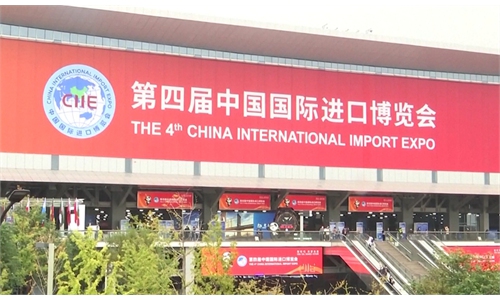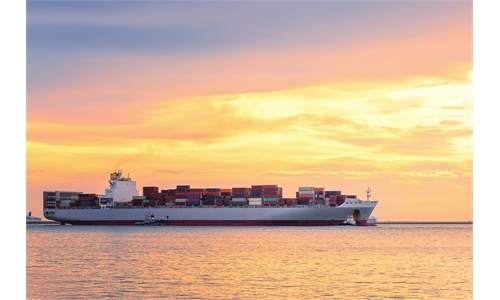
Shoppers run to get in line during Black Friday shopping at Fashion Outlets of Chicago in Rosemont, Illinois, the United States, on Nov 27, 2020. Photo: Xinhua
The traditional big promotion day of Black Friday is around the corner, but widespread shipping delays cause US buyers to suffer a most expensive holiday.
The butterfly effect is traceable on the other side of the Pacific Ocean, and Chinese exporters also found out they, too, suffer from a supply chain crisis, although they have been prepared for the big promotion day months ago.
"The sales of Chinese sellers on Amazon for Black Friday will be about 80 percent of last year, given supply chain problems and rising labor costs," Wang Xin, president of the Shenzhen Cross-Border E-Commerce Association, told the Global Times on Friday.
Wang explained that many materials, such as chips and 3C electronics come from abroad, and the price of these raw materials has increased by 10 to 50 percent in the past two years, making Chinese products' prices 10 to 40 percent higher.
"Our inventory for this year's Thanksgiving has shrunk drastically because we could not order the containers, aside from an increase in the price of shipping by 30 to 50 percent. Our revenues have been substantially shrunk this year," according to Guangdong-based clothes exporter surnamed Wang.
"Lucky if my company can survive," he told the Global Times on Friday.
Wang is not alone. Several traders and producers based in Yiwu, East China's Zhejiang Province and South China's Guangdong Province told the Global Times that some companies have stopped taking new orders this year, as the surge in orders is also a test of the supply chain and capacity.
Chinese exporters said they saw signs of a supply chain problem in March, and worsened in May and June. The shipping schedule has become increasingly unpredictable, and the goods are blocked in foreign terminals and cannot be delivered to customers.
The stuck goods and the money companies have to pay for the inventory have become the "killer" of exporters' capital chain.
Some goods have been stuck at ports in the US for up to a month, which raises their costs. But Chinese exports have been preparing for the big promotion day for months," Wang said. "Chinese exporters are also victims of the supply shortage."
In order to alleviate port congestion, the US government has also thought of many ways. Following the failure to implement the 24-hour work system, the busiest ports of Los Angeles and Long Beach in the US proposed plans for Container Excess Dwell Fe.
According to relevant policies, the two ports will charge for containers planned to be transported locally by truck from the 9th day of their stay at the port, with a charge of $100 per container on the first day of overdue, $200 on the second day, and so on. The plan took effect from November 1.
No matter what kind of policy, it is the US customers hurt most during this round of supply shortage.
CNN reported that US consumer price inflation surged higher again in October. Over the past 12 months, prices climbed 6.2 percent -- the biggest increase since November 1990.
The Biden administration and the Federal Reserve have been adamant that the price hikes are temporary and to be expected as the economy rebounds from its worst crisis in a generation.
Chinese experts said that the root for the increase in Black Friday prices and the increase in US CPI is that US supply cannot keep up with demand, such as the congestion of logistics ports, but tariffs have added fuel to the fire.
The increase in tariffs on China has a considerable impact on the rise in the US CPI. Because the current tariff category covers most of the products, and if you don't find China to buy, there is no place to buy, Gao Lingyun, an expert at the Chinese Academy of Social Sciences in Beijing, told the Global Times on Friday.
"Most of the tariffs imposed are borne by importers, but will be transferred to the US consumers finally," he said.



